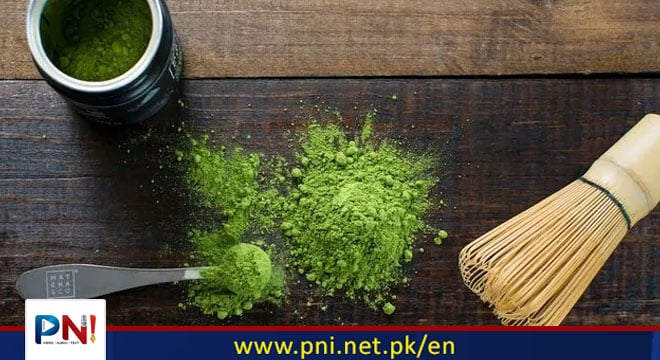ISLAMABAD, May 30 (Online): Periodontitis is a form of gum disease that affects approximately 90% of adults globally.
It is associated with other chronic inflammatory conditions, and can progress to the point that it can affect the jaw bone.
Prevention is better than treatment, and is possible with good oral hygiene.
Researchers in Japan have discovered that a mouthwash made of matcha extract could reduce levels of a bacteria that drives the development of it.
Using matcha extract as a mouthwash could reduce the amount of a certain bacteria that causes periodontitis — at least that is what a recent study suggests.
Researchers in Japan have shown in a clinical trial of 45 people, that mouthwash containing matcha extract, significantly reduces the amount of Porphyromonas gingivalis, a bacterium that causes pockets in the gums around the base of teeth.
The study results appear in the journal Bacteriology.
P. gingivalis colonizes the biofilms that exist on the teeth, which can cause the infections that lead to gum disease, or periodontitis.
Researchers have proposed that matcha extract reduces levels of this bacteria both in vivo and in vitro, as it affects the bacterial cell envelope which is crucial to its survival as it maintains the cell’s environment, shape and response to its environment.
Matcha extract mouthwash reduces harmful bacteria
Having previously found that curry leaf and fennel can have antibacterial effects, researchers have recently investigated the effect of matcha extract on 16 different types of bacteria, commonly found in the mouth.
They created their own matcha extract, comparing it to normal green tea and extracting it with different compounds to discover which was the most effective extract against P. gingivalis.
They then tested the efficacy of a matcha solution against 16 oral bacterial species, including three strains of P. gingivalis, in vitro.
The researchers found that P. gingivalis, Prevotella nigrescens, and Fusobacterium nucleatum were all inhibited by the matcha extracts.
‘Very exciting’ study offers pointers about lowering gum disease risk
In order to determine the efficacy of matcha in vivo, researchers from the Nihon University School of Dentistry at Matsudo, and the National Institute of Infectious Disease in Tokyo carried out a clinical trial of 45 people.
All of these participants had signs of pockets caused by periodontitis, were adults over the age of 20, were not smokers and had no allergies
All received a powder with instructions on how to dissolve to form a mouthwash and how to use it by a periodontist. The group were split into three: one group received matcha, one barley tea, and the other sodium azulene sulfonate, which is used as an anti-inflammatory treatment.
The participants used the mouthwash for a month and were followed up at the end of the month.
The researchers found that participants who used the matcha extract mouthwash had significantly lower levels of P. gingivalis.
However, while they found a reduction in the size of the pockets in participants’ gums, this reduction was not proven to be significant.
Commenting for Medical News Today, Jeffrey S. Haddad, DDS, a cosmetic dentist at Rochester Advanced Dentistry, who was not involved in the research, said he was nevertheless excited about the study findings.
“I think it’s exciting to learn this because anything that we can do to help reduce the bacteria in our mouth, and especially the bacteria that can cause gum disease is a good thing,” he told us.
He highlighted that researchers had been unable to point to a potential mechanism that could be underpinning the findings, but emphasized that any research showing that this bacteria could be reduced is worthwhile.
According to Haddad:
“[T]his study is very exciting. It gives us a lot of information on incorporating this into treatment of either people who have the potential for periodontitis or who have periodontitis and are trying to manage it.”
What is the impact of periodontitis?
Ultimately, periodontitis is a gum disease which, if left to progress, can cause problems with the jaw bone that holds the teeth in place. Recent developments promote prevention rather than cure, with good oral hygiene being at the forefront of efforts.
“‘Periodontitis’ is the medical term for gum disease, which begins as gingivitis before advancing to the periodontitis stage,” Jerald Friedman, DDS, from North Jersey Oral & Maxillofacial Surgery, not involved in this study, explained for MNT.
“Inflammation in the supporting structures of the teeth, including gums, the jaw bone, and surrounding ligaments characterize it,” he noted. “Inconsistent oral hygiene, chronic dehydration, and stress are all risk factors for developing this condition.”
While these are all modifiable factors that individuals can act on, other factors, including hormonal changes and having diabetes, can also increase a person’s risk of periodontitis, Friedman told us.
“In addition to regular brushing and flossing, consistent dental check-ups and cleanings are essential for managing all stages of gum disease. Scaling and root planing is a common first step in treating periodontitis,” he pointed out.
Follow the PNI Facebook page for the latest news and updates.









